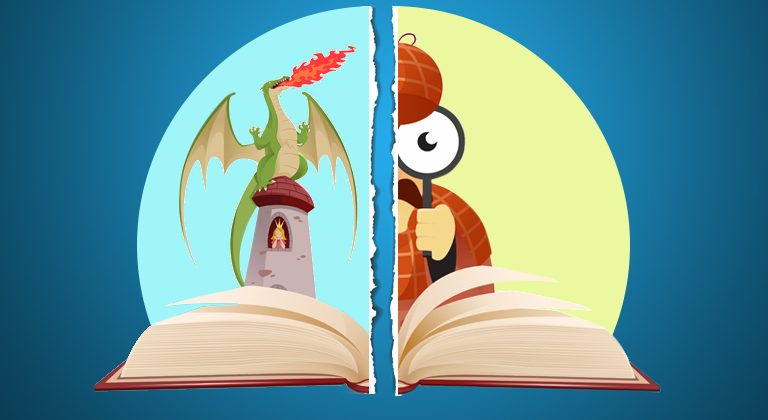The Secret to Daily Word Counts – The Path of Least Resistance
If the old saying that “a writer writes” is true, why do so many authors find it difficult to keep the words flowing? Ginger has some thoughts on that, and shares some tips for authors who are serious about turning self-publishing into a career – or who already are, but just want to become more productive. The points below all ring true to me, particularly the second one as that was what led me to a corporate job and away from writing for many years (although in my case, it was more my own logical mind that talked me out of writing rather than anyone else – but the solution was the same.) So if you’re looking for a few tips on increasing your daily word count and finishing your books, read on!
During all my blog posts about marketing, advertising, and promoting your books, I hope one thing has remained clear – that the secret to being a successful self-published author is simply to keep on writing! As long as you’re dedicated to learning your craft, and spending time studying advertising, and marketing, and promotion, you’ll eventually know how to launch a book successfully – but if you haven’t got a book to launch, then all of that will have been for nothing.
There’s not a single successful self-published author who doesn’t keep producing published books – from one a month, to one every six months, or so. Each new book is what keeps their empire surging for the next couple of months while they work on the next one – because they’re always working on the next one.
The level of productivity varies – some romance authors literally publish a new book a month, while others have very comfortable six-figure incomes by publishing two or three new books a year. In any event, one thing remains clear – it’s publishing new books that makes a self-published author really successful, not just advertising the old ones.
But this is also one of the trickiest commitments to make as a writer – and I speak from bitter, bitter experience. With varying degrees of success I’ve conquered it – but for two years I struggled with committing to sit in front of a keyboard and work on my own writing each and every day. My most successful months – the ones which far eclipsed my income doing anything else, ever – were always following a regular publication schedule. The months things got really bad, it was always because I hadn’t published in a while.
So, you have to keep writing. It’s more than discipline, it’s more than habit – it’s a commitment. Writing is your coal mine, and you need to hack away at it each and every day.
But why do so many of us struggle with that? Why do so many of us climb into bed at night lamenting the fact that we didn’t write that day?
Well, the answer is – it’s not your fault.
You struggle with writing because your beautiful, timeless prose is created inside a clunky, caveman-era brain. Our brains are like primitive computers and the programming that runs them dictates so much of our behavior that it’s actually painful to try and break free of it. This isn’t writer’s block – when your brain rejects your story line because there’s a flaw in it you haven’t consciously noticed yet – but more like mental block: The engine of your brain seizing up.
There are several reasons for this.
Problem #1 – Your dumb, caveman brain
Some of it is pure and parcel caveman stuff. Our brains are wired up like old Commodore 64s and yet we live in the era of Google and SpaceX. Each and every day we’re bombarded with so many social media messages, advertising, pings, notifications, pushes, pokes, and smiley faces that our brain is flooded with dopamine and we can’t focus on ANYTHING unless it’s in seconds-long, mid-scroll, ADHD-flavored bursts of super-stimulation.
Sitting down and writing in front of a computer is the antithesis of this. While writing is like magic, there’s something deeper there than the ‘ping’ of a dopamine-inducing notification and your brain often tries to trick you into diving headfirst into endless scrolling or YouTube videos rather than getting down to that. Our focus is like an appetite, and writing is broccoli and grilled chicken to our attention, compared to the Big Mac and Whopper of social media.
Solution #1 – Rise with the dawn, write like a caveman
I strongly recommend making a commitment to write first thing in the day, before you even look at your phone or switch on the TV. Set your alarm an hour early, and assume you’ll have at least half of that to spend writing. Your brain will be so dopamine-depleted after a night’s sleep that writing will be like a steak dinner to your attention span, and you’ll quickly and cleanly slip into the writing zone.
Also remember to switch OFF your phone and any notifications while you write. Any ping or ding is going to send a flood of dopamine to your brain, and getting back to increasing your daily word count instead of picking up your phone will be increasingly and frustratingly difficult.
Problem #2 – Your dumb, stupid, modern-day society
What’s moved you in life? What are the things that will remain with you until the day you die? Aside from your friends and family, the chances are that they’ll be some kind of creativity – music you’ve heard, books you’ve read, or movies you enjoy. Things that are created are timeless – we’re still performing Shakespeare’s plays hundreds of years after he wrote them, and they continue to delight generation after generation. Your writing deserves to be part of that lexicon – even if Shakespeare doesn’t need to start getting nervous about you eclipsing him.
But what is it you’ve been told all your life about writing? That “it’s fine as a hobby, but you should get a real job to support yourself” or “you should do something more sensible – you’ll never make it as a writer.”
All our lives, we’re surrounded by well-intentioned people – who only want the best for us – and they try to protect us from flying too close to the sun by clipping our wings. It’s the death of a thousand cuts – each time carving a slice of your hopes and dreams from you. The British commedian Dylan Moran once summed it up by saying:
“People will kill you. Over time. They will shave out every last morsel of fun in you with little, harmless sounding phrases that people uses every day, like: ‘Be realistic!'”
But people who are realistic don’t end up becoming successful writers. They end up becoming bookkeepers, and marketing managers, and Directors of Solutions Management, whatever the hell that is supposed to be. They follow the ‘safe’ advice to study hard, get a good job, and then live and die in that career just because the people they trusted most filled their heads with the idea that really committing to writing was ‘too risky.’
You know what’s too risky? Getting to 45-years-old and never having taken that risk. Nobody remembers the name of a great 16th century book keeper, or marketing manager – so maybe the bigger risk is NOT writing.
Solution #2 – Unwrite your programming
I was nine years old when I first decided to be a writer – and yet I got a degree in English, and studied advertising and copy writing, and ended up sitting at a desk doing the exact opposite of what I wanted to do for 15 years. It wasn’t until I was 40-years-old that I had my first hit book and realized that I could and should have been focused on writing all this time – that all the people I’d listened to over the years had been wrong!
Our heads have been filled with the lie that we should play it safe – by our parents and those that love us, by schools and universities that are designed to follow the ‘Prussian Method’ and produce obedient little worker bees, and by those who used to hold the keys to the world of publishing; who thought they knew it all for so many years, but are now being proven to be clueless by enterprising, self-published authors who eclipse them.
The people you trusted most? They were all wrong, and you’ve been robbed of all the years you’ve wasted believing them.
The worst part is that modern society has changed in such a vast way that even ‘playing it safe’ isn’t safe any more. We live in an era of off-shoring and automation. Companies now extend part time hours or offer ‘contract’ positions to avoid providing healthcare or benefits. During the COVID-19 lock down millions of Americans discovered they were ‘non-essential’ and just expected not to work for eight weeks – and so it became clear: Playing it safe – relying on the benevolence of a an employer – was no longer the safe, smart, or sustainable option.
We live in a gig culture. It’s hustle city. Writing offers a potential career path if you’re willing to truly commit to it – but part of that commitment is treating writing like a job, and unwriting the decades of programming that taught you it was somehow frivolous, or fanciful.
I mean, obviously don’t just quit your job if you’ve got a mortgage to pay – but make a commitment to treat writing like you can and will make a living from it one day, and hopefully you’ll find that dream becoming a reality sooner than you could have thought possible.
Problem #3 – You have negative emotions attached to writing.
This is the sneakiest of all reasons people find it difficult to regularly add to their daily word count, and I know because I only untangled the thorny problem recently. It was actually this YouTube video that unlocked the secret for me – and why I was filled with dread at the thought of doing the one thing that fulfilled me more than anything else: Write.
The answer was a combination of the two points above – our dumb, stupid brain and how society had programmed it.
So, I tend to get up early in the morning to write – and that’s always been my most productive time for getting words on paper. The two or three hours I spend in the dark and quiet, immersing myself in my story, are some of the best of my entire day; and I also feel an enormous sense of accomplishment having “done my writing for the day” with the whole day left ahead of me.
I found if I tried to write at other times, I couldn’t. I’d be frozen. I’d feel this knot in my belly, and an almost physical sensation of nausea.
Andrew Kirby’s YouTube video revealed that my feelings were because I’d attached negative emotions to writing – partly from the years of being told to do something more sensible, instead, and then partly from my own experiences.
In the early days, I’d struggle to sit down and write and then have one of my three kids come and disturb me, asking for an ice-cream or juice box, and I’d feel this intense frustration as I’d have to stop mid-flow, knowing how difficult it would be to get started again. Or else I’d remember how tight we’d been for money one month, and how I’d felt physical sensations of guilt for writing my book when perhaps I “should” have been doing short-term freelance work to cover the bills.
(Of course, focusing on the short term means you build nothing for the future – so you’re literally stealing from yourself if you do.)
Whatever the events that caused these negative emotions were, they happened frequently enough to ‘train’ my brain into associating them with writing; and cut out the middle man.
Instead of going: Sit down to write > frustrating event > negative emotion, my brain would just go: Sit down to write > negative emotion.
I’d trained myself to hate doing the thing I loved, and the thing that offered me a path out of doing what I didn’t want to do (which, ironically enough, was what was stopping me from writing.)
Solution #3 – Retrain your brain and emotions
For me, getting up at 4am every morning was a sacrifice, but it allowed me to write without the associated negative emotions of being disturbed or interrupted. So, the first solution you can find is simply to figure out what caused those negative emotions to be attached to writing and circumvent them.
The second trick is to simply save up your willpower and force yourself to write – even if it’s garbage. I managed to achieve this with an egg-timer, which I set to 25 minutes (which would be an extremely boiled egg, now I come to think of it.)
I sat down and dry-swallowed the feelings of dread, and promised myself I’d write for 25 minutes and that’s it.
Because 25 minutes is nothing. I probably waste that much time staring out of the window when I’m trying to force myself to write. As soon as I set that escape plan in place, I find the emotions drift away because I no longer worry about being disturbed or spending important time writing when I “should” be doing something else. 25 minutes is a drop in the ocean, and if the egg-timer rings and I go off and do something else at least I’ve got some words down.
But this works in two ways: Firstly, you do exactly what you set out to – you write. Even if it means only adding a few hundred words – or just a few dozen – you’ve still written. If you do that each and every day, your word count will continue to increase until your book gets finished.
Secondly, you start to disassociate the negative emotions from writing. The more you sit down and ACTUALLY put words on paper, the more your brain disconnects the Sit down to write> from the >negative emotions.
This makes it easier to sit down and write in the first place, and it makes it more likely that you’ll take longer and longer stretches, until you’re approaching where you want to be.
BONUS SOLUTION: The path of least resistance
In the previous tip, you basically ‘tricked’ your brain into ignoring all the procrastination triggers and getting down to business by setting that self-imposed 25 minute time limit. Bet you didn’t know you could do that, did you?
Well, you can do similar things to force yourself to write, by using the same principles.
Humans are essentially animals, and we’re biologically engineered to take ‘the path of least resistance’ and conserve our mental and physical energy by doing the least possible – and decades of Crossfit hasn’t changed this from being our default setting. Whatever obstacles you have towards sitting down and writing – the mental ones, like negative emotions, or the physical ones like your laptop needing to be charged – it takes willpower to overcome them, and we only have a certain amount of willpower.
So, what do you do? You change your environment until writing becomes easier than not-writing.
For example, the last thing I do when I go to bed at night is load up the coffee machine for 4am, set my alarm, put a glass of water by my bed and open up my work-in-progress on my computer. Therefore, when I wake up the next morning, all the steps are already laid in place to carry me and caffeinate me from my desk to my computer.
I also use voice dictation when I’m on long car journeys. I find I can log thousands of words this way, although I haven’t invested in Dragon voice-dictation software yet, so it takes almost as long to edit them as it does to write them. However, they are written, more or less.
Likewise, I use my Microsoft OneDrive account to store my work-in-progress, and then I have it open on my desktop computer, and my laptop downstairs, and the $200 HP Stream that has inexplicably kept operating for the last five years. Now, if I’m in the kitchen, office, or about to head out into the garden – I have no excuse not to take a device and write on it, and it updates the manuscript on my other computers at the same time!
If you make it so easy for yourself to write that it’s almost easier than not writing – you’ll write. I promise.
And that’s the secret to a successful self-publishing career – because if you don’t commit to writing everyday, you’ll take forever to finish your work-in-progress. If you don’t finish your work-in-progress, you’ll never have a book to market and sell. If you don’t have a book to market and sell, nobody will ever buy it – and if nobody ever buys your book, how do you expect to make it as a self-published author?
Make your life easy, by making it difficult not to write. That’s one of the tricks that will transform the trajectory of your self-publishing career.












Dylan Moran is Irish, not British.
One of the best articles on productivity I’ve ever read! And I’m somewhat of an “expert” having gone from writing one book in four years to writing eight books in one year!
Thank you!